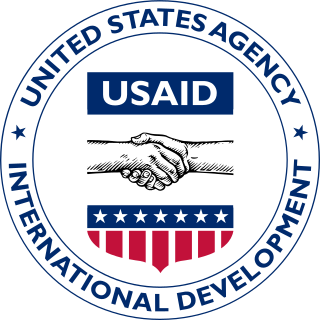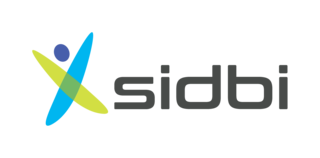
The European Investment Fund (EIF), established in 1994, is a financial institution for the provision of finance to SMEs, headquartered in Luxembourg. It is part of the European Investment Bank Group.

The European Investment Bank (EIB) is the European Union's investment bank and is owned by the 27 member states. It is the largest multilateral financial institution in the world. The EIB finances and invests both through equity and debt solutions companies and projects that achieve the policy aims of the European Union through loans, equity and guarantees.

The United States Agency for International Development (USAID) is an independent agency of the United States government that is primarily responsible for administering civilian foreign aid and development assistance. With a budget of over $50 billion, USAID is one of the largest official aid agencies in the world and accounts for more than half of all U.S. foreign assistance—the highest in the world in absolute dollar terms.

The Overseas Private Investment Corporation (OPIC) was the United States Government's Development finance institution until it merged with the Development Credit Authority (DCA) of the United States Agency for International Development (USAID) to form the U.S. International Development Finance Corporation (DFC). OPIC mobilized private capital to help solve critical development challenges and in doing so, advanced the foreign policy of the United States and national security objectives.

The U.S. Economic Development Administration (EDA) is an agency in the United States Department of Commerce that provides grants and technical assistance to economically distressed communities in order to generate new employment, help retain existing jobs and stimulate industrial and commercial growth through a variety of investment programs. EDA works with boards and communities across the country on economic development strategies.

The KfW, which together with its subsidiaries DEG, KfW IPEX-Bank and FuB forms the KfW Bankengruppe, is a German state-owned investment and development bank, based in Frankfurt. As of 2014, it is the world's largest national development bank and as of 2018 Germany's third largest bank by balance sheet. Its name originally comes from Kreditanstalt für Wiederaufbau. It was formed in 1948 after World War II as part of the Marshall Plan.
Improving Economies for Stronger Communities (formerly known as International Executive Service Corps) is an international economic development not-for-profit organization with headquarters in Washington, D.C. IESC was founded in 1964 by David Rockefeller, States M. Mead III, Frank Pace, Sol Linowitz, and other American business leaders. IESC has worked in sub-Saharan Africa, Europe and Eurasia, Asia and the Near East, and Latin America and the Caribbean. Geekcorps is a division of IESC.

The U.S. African Development Foundation (USADF) is an independent U.S. government agency established by Congress in 1980 to invest directly in African grassroots enterprises and social entrepreneurs. USADF's investments aim to increase incomes, revenues, and jobs by promoting self-reliance and market-based solutions to poverty. USADF targets marginalized populations and underserved communities in the Sahel, Great Lakes, and the Horn of Africa. It partners with African governments, other U.S. government agencies, private corporations, and foundations to achieve transformative results.

Small Industries Development Bank of India (SIDBI) is the apex regulatory body for overall licensing and regulation of micro, small and medium enterprise finance companies in India. It is under the jurisdiction of Ministry of Finance, Government of India headquartered at Lucknow and having its offices all over the country.
SME finance is the funding of small and medium-sized enterprises, and represents a major function of the general business finance market – in which capital for different types of firms are supplied, acquired, and costed or priced. Capital is supplied through the business finance market in the form of bank loans and overdrafts; leasing and hire-purchase arrangements; equity/corporate bond issues; venture capital or private equity; asset-based finance such as factoring and invoice discounting, and government funding in the form of grants or loans.

The United States and North Macedonia enjoy excellent bilateral relations.

Trivest Partners, L.P. is the oldest private equity firm in the Southeast U.S., founded in 1981, and focuses exclusively on founder and family-owned businesses. Trivest is headquartered in Miami, Florida with regional offices in Charlotte, Chicago, Los Angeles, New York and Toronto. Trivest has provided "Private Equity for Founders" in the lower middle market through its flexibility in transaction structuring and related "Just Say No" program, which eliminates the typical pain points faced by founders looking for outside investment. The firm is largely industry-agnostic, but focuses on investments in the consumer, business services, healthcare, value-added distribution and niche manufacturing sectors.
Enterprise Capital Fund is a British government financial programme that provides venture capital funding to Start-up companies that is operated by the British Business Bank.
Cultivating New Frontiers in Agriculture (CNFA) is a non-profit international development organization based in Washington, DC. CNFA's mission is to increase and sustain rural incomes in less developed areas of the world by assisting farmers and rural entrepreneurs. CNFA works in Eastern Europe, the Caucasus, South and Central Asia, Africa, the Near and Middle East and the Caribbean to improve agricultural economies by:

The Grassroots Business Fund is a non-profit organization based in Washington, DC. It has field offices in Kenya, Peru, and India.
Oliver Kosturanov(1968–2014) was a Macedonian businessman, president of the board of directors of Makedonski Telekom, and SEAF's Director General for Macedonia.
Capital for Enterprise Limited (CfEL) was a limited company in the United Kingdom owned by the Department for Business, Innovation and Skills (BIS). CfEL was responsible for managing BIS's financial schemes, such as venture capital funds and loan guarantees, aimed at helping small and medium enterprises (SMEs). It invested over £1.8 billion from its formation and alongside private capital provided £6.5 billion in credit for SMEs. It ceased operating independently on 1 October 2013 and became part of the British Business Bank.
The U.S. Russia Investment Fund (TUSRIF) was an investment fund from 1995 to 2008. It was established by the United States government to make private investments in the Russian economy. By 2005, it had invested $300 million in 44 Russian companies. James Cook, Managing Director, founded and developed two of the leading companies DeltaBank, the first bank to sell credit cards in Russia, and DeltaCredit, the first bank to sell residential mortgages in Russia. TUSRIF was replaced by the U.S. Russia Foundation (USRF) in 2008, while its financial arm, Delta Private Equity Partners, was purchased by Deutsche Bank in 2009.

Venture capital in Poland is a segment of the private equity market that finances early-stage high-risk companies based in Poland, with the potential for fast growth. As of March 2019, there is a total of 130 active VC firms in Poland, including local offices of international VC firms, and VC firms with mainly Polish management teams. Between 2009–2019, these entities have invested locally in over 750 companies, which gives an average of around 9 companies per portfolio. The Polish venture market accounts for 3% of the entire European ecosystem of VC investments, mainly in the digital space.
The Development Bank Ghana (DBG) is a government-owned development bank in Ghana. Owned by the government of Ghana, the institution has received grants and loans for on-lending to Ghana's commercial banks, from the African Development Bank, the World Bank Group, the European Investment Bank, and the German Development Bank. The DBG focuses on providing indirect loans to small and medium enterprises (SMEs), with less than 100 employees each. A key area of interest in their immediate and long term plans is environment, social and governance focus to help build a sustainable economy in Ghana. Fostering solid collaborations to support growth in the economy, generate jobs, and strengthen the capabilities of SMEs is the goal of DBG. DBG offer de-risking services and long-term funding, supported by technology and research and insights that are founded on solid facts. DBG additionally aims to draw in, nurture, and keep talented individuals. Run as a self-sufficient, eminently successful institution. Last but not least, DBG encourage ESG excellence within the companies we sponsor.












